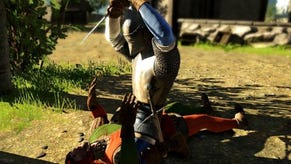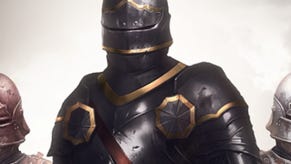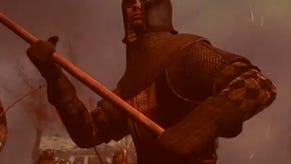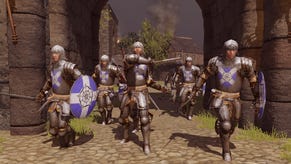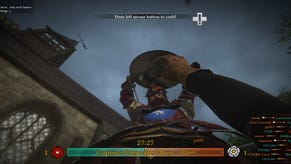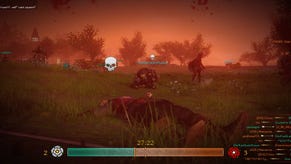Interview: Adding Shieldmaidens To War Of The Vikings
No Nonsense, Just Norse Sense
War of the Vikings, Paradox Interactive's sequel to the gritty and gruesome War of the Roses, is about to receive its first expansion, a relatively modest addition that adds one new class: the Shieldmaiden. Executive producer Gordon Van Dyke, a veteran of multiplayer development who can trace his history back to some of the early Battlefield games, says it's an opportunity to not only shake up the way the game is played and the patterns that players are falling into, but that it might also be a chance to challenge a few assumptions about gender.
At Paradox's annual convention in January, Van Dyke spoke to me about his plans to introduce women warriors to the game and how it was important to him that they be dressed in realistic, practical gear rather than sporting the tired trope of stylised “boob armour,” the sort of curvy breastplates and chainmail bikinis that have plagued video games for decades. He explained how this expansion is his chance to make good on his ambition, why there should be women warriors in his game and how he relishes a chance to challenge some of gaming's sexist conventions.
RPS: You've got this expansion coming out, featuring the new Shieldmaiden class. First of all, what does the class add to the game?
Gordon Van Dyke: Yes, we have, and it's exciting. The new class brings something that's different to our existing ones. Those existing classes, they demonstrate the core mechanics of the game and they needed to be somewhat similar, but now we can add new layers to combat and that's what the Shieldmaiden is going to do.
It's a class that can wield a spear and shield combo, the only class that can do that, and it really changes the combat. Right now, we've noticed a lot of players are going with a Champion, two-handed axe combo. The main reason is that class can take a little more damage and is more favourable to error. You can take a couple of hits and make a few mistakes. If you pull off a charged strike, you can easily take down your opponent in one or two hits, while it might typically take them around three.
What this class does is really shake things up for those players. The Shieldmaiden has a bigger shield, for added protection against axes, and it's much stronger so you can't shatter it in the same way you can smaller ones. With the spear, you can do some really precise strikes and catch those two-handed axe guys off-guard when they're still charging up. The spear's just for hand-to-hand combat, but you could attach the Blind Fury perk so that you can throw it.
RPS: So this is a class that you've made in direct response to how you've seen the game evolving? To what and how players are choosing to play?
Gordon Van Dyke: Exactly. And while it will be paid DLC if you want to customise your Shieldmaiden, everyone will get the default Shieldmaiden. That'll give them the Shieldmaiden class with a sword, shield, javelin and dodge/block perk.
There's still a lot of new things you can do without customising. For example, when you're bandaging a teammate, the Shieldmaiden puts her shield up so that you can revive them in cover and protect yourself from archers.
RPS: When you were talking about the idea of a Shiledmaiden, back at the Paradox Convention, you sounded excited about the idea of featuring women in the game. It was one of the first things you mentioned in your presentation.
Gordon Van Dyke: Yes, I am excited, and it's because I like to stir up a little bit of trouble! That's a part of my personality. People still seem to be really adamant about not accepting that there were female warriors, that there were these women that participated in combat. Regularly.
During development, I did some research and I went into it with an open mind. I don't really have those kind of stereotypes forced into me, where I can't accept that something is different to what I've been told or taught, and I sat down with the archaeologist [Charlotte Hedenstierna-Jonson, PhD --Archaeology Ed] that was in charge of the biggest Viking find, in a place near Stockholm called Birka. She very strongly believed that it was more likely than we currently think.
The key thing about Norse culture was it allowed women to choose their path when they came of age. They didn't have to go straight into marriage, they weren't forcing those roles in society, those gender roles that you'd see in a patriarchal society.
RPS: So while you've got detractors claiming this isn't realistic, there's evidence that women fought? And that when Vikings invaded and settled abroad, they came as both men and women together, bringing some of their livestock too?
Gordon Van Dyke: People think that the Vikings were only raiders, but that's not actually what happened. It was more that they were trying to settle. That was a scary thing for those who already lived there, especially the Saxons, because that was a threat to them, just like in modern society where you have different cultures mixing. People are afraid of a new culture because they don't understand it and it's scary to those in control because it can potentially remove their power.
Yes, they would bring some of their livestock, though England was very rich with game and had great soil for crops, so those Vikings didn't have to bring too much, but they brought all sorts people over, men and women.
RPS: You're trying to portray these women as being practically dressed for combat and that shouldn't be a big deal, yet we've got a long history in games of very stylised and rather silly armour. Where do you think the whole “boob armour” tradition has come from?
Gordon Van Dyke: Well, it comes from society. Sex sells, whether we like it or not. Sexualising something, for a man or a woman, adds appeal. I don't think think it just applies to women; you see guys who want to be a good-looking, fit action hero when they're playing, but of course it's less tasteful when you have men who have been dominating an industry and who are able to portray what they want.
If you look at female characters in a lot of other video games, they're often made to stand out. What's the first way developers do it? They naturally go towards sexualising them, toward the boob armour thing. People see this fantasy armour with oversized cleavage coming out of it and, for some people, that's a draw. But I think there's as many players, or more, who aren't drawn to that sort of thing.
I don't know if it has like an intentional, evil reasoning behind it, but people go with what they like. If you look at the Metal Gear series, for example, I don't think Hideo Kojima is a misogynistic pig. I've met him and I'd be shocked if that was the case. But he does come from a different culture and he likes attractiveness from things. He likes his male characters to be extremely sexy and sexual, wearing tight clothes and being muscular and well-endowed. He sexualises everyone, not just women, though of course you had the whole thing around that new character Quiet being “good for cosplay.”
I think in his universe, in the lore that he created around that, it kinda works as they're all wearing things that aren't practical for men or women, but I want to work on things that are more practical, more steeped in reality. We have this opportunity to take misconceptions about the Norse culture and try and present our view on it.
[Archaeologists] are re-examining bones from grave sites that they assumed were men because they had this long-standing belief that women didn't fight in combat, a belief that came from 1,500 years of a patriarchal society dominated by Christianity. It's hard to break out of that mindset. They looked at graves and said “Oh, this was a guy, cause he's buried with a sword and a shield.” They never examined the bones to really know if that was the case, but they've now gone back and re-examined some of them and found women in these graves. I think we'll see more and more of that.
We also went with the kind of idea that you see in Game of Thrones, where you have Yara and Ygritte, these really strong female characters like Brienne of Tarth. She's massive, she's strong, and I highly doubt that physiques of men and women today are identical to what they were 1,500 or 1,700 years ago. We've changed, we've become softer. All people were strong back then. You had to be, to survive.
RPS: Have you had criticism for this from players, or any resistance to what you're doing?
Gordon Van Dyke: Oh yeah, absolutely. If you want things to change and if you want to challenge what people consider the norm, you're going to get resistance. And if you want to take on a challenge, you have to be prepared for that. You need to stick with what you've learned and what you believe in. This is what we believe, this is [the Norse culture] we want to reflect and we think it's an accurate reflection of that period in time.
Some people will never want to accept it, but there's people who still want to think that the world is flat, that we didn't go to the moon. There's all sorts of ideas that people don't want to accept or believe.
RPS: Are you worried about player behaviour or player response to the new class? Do you anticipate any problems in-game?
Gordon Van Dyke: I haven't really given it that much thought because, when you get into the game, the new class is just as aggressive and just as deadly. We asked ourselves, if there was a woman fighting at this time, how would she equip herself to be successful in battle? We just focused on that and wanted to make sure that was the key factor. It's the same goal we had with our other characters.
Yeah, I think some players might be ready to be anti-Shieldmaiden. After a few rounds, after they see how much the class adds to the game, if they care more about gameplay and about having a good time, that'll override any of those perceptions. This is a class that kicks ass.
RPS: You've previously mentioned that becoming the father of a daughter might have influenced how you think about the treatment and representation of women, as well as our expectations of them. Do you think that's made a difference?
Gordon Van Dyke: Absolutely. I think everything in your life influences you to some degree, but when I think more about it, I agree. I look at her, when I watch her behaviour and I see how she does things.
She really likes Batman, so I gave her this mint condition Batman action figure that I'd saved, that I'd had in the box since like 2000 or maybe 1998. She saw it and wanted it, so I just gave it to her. I was like, “Y'know what? I'll never sell this, I'll never do anything with it.” It's silly for me to have it and she wants to play with it, she wants to play with Batman and so she gets to play with Batman! I buy her a lot of Star Wars stuff, like Stormtrooper pyjamas, and she loves those things. I want to give her fair choices. I think that [mentality] starts to get reflected in how you view other things, including making games.
And there's no reason not to. Even if we weren't trying to be historically accurate, I think it's silly to hold on to some of those old-fashioned ideas. In modern military games you have players complaining that women don't fight on the front lines. Well, that's really only in the US military, which is still a patriarchal system, still overly controlled by those old Christian views of things. If you look at many other armies, like the Israeli army, they have women in the front lines. I think it's ridiculous when people say that a particular gender can't do something. It's no different to saying that one ethnicity can't do something. It's that same dolty kind of mentality.
It's demoralising at times, but it's also fun to see it as a challenge, to ask how we can change that, and I think featuring women warriors in a way where they aren't sexualised is one way. Like, I think the new take on Lara Croft was better. You still see some glimmers of that old mentality, like the shot in the beginning where she's hanging from the cliff and you're looking down her shirt, getting a nice little boob shot there. Did they have to do that shot? Probably not. Could they have changed the clothes a bit?
I put more clothing on my Lara and I thought she looked pretty kick ass. With the custom clothing, I tried to make her look more like a bad ass than a cute girl who happened to survive a shipwreck that killed all those trained military men.
RPS: Does being at Paradox help? You're in Sweden, a country that's considered more progressive, working at a place where a lot of both men and women work together on games.
Gordon Van Dyke: I think it helps. You don't have a mob mindset, or one that's afraid to take this sort of thing on. You have peers and co-workers around you that support you going against the grain. I think there's a lot of other people thinking this way now, so it's not just us, but I do like that we're one of those developer pushing this, saying “Hey, there are other options.”
I'm not somebody to tell other people what to do. If other people like their boob armour, and that's what they think is best for the game, then they're free to do whatever it is that they want. But when I have a choice, that's not something that I want to do. I hope that our audience, the people who buy our games, also feel the same and support our point of view.
RPS: Thank you very much.








